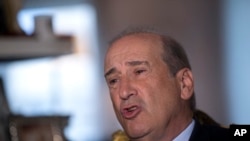A decision by Spain's government to remove Francisco Franco's remains from a state mausoleum is simply an act of political opportunism ahead of next month's election, the late dictator's oldest grandson and namesake said on Wednesday.
Francisco Franco Martinez-Bordiu will play a leading role in Thursday's low-key ceremony in the Valley of the Fallen outside Madrid.
He criticized both politicians and the judiciary for allowing his grandfather's exhumation, and reburial in a nearby private family vault, to proceed.
"I consider the exhumation a profanation," he told Reuters late on Wednesday from his home in Madrid's embassy district.
"I feel a great deal of rage because (the government) has used something as cowardly as digging up a corpse as propaganda, and political publicity to win a handful of votes before an election." Spain goes to the polls on Nov. 10.
A long-standing ambition of the acting Socialist government, the exhumation was ratified by parliament and approved last year by the Supreme Court, which viewed it as a valid interpretation of a 2007 law promoting recognition of those who suffered under Franco's regime.
The same court rejected an appeal against the operation lodged by the Franco family, which was also refused leave by authorities to drape the coffin in the national flag and invite media to the ceremony.
"They have sought to restrict access to such a point - because they want their own photographs, their own images. It is nonsensical that they would refuse to let us drape the Spanish flag over the casket," he said. "They have buried him where they've wanted and how they've wanted, completely ignoring any right that we (might) have."
More than four decades after the dictator's death in 1975, the exhumation has touched a nerve in a country where divisions over his legacy remain acute.
An El Mundo poll this month showed 43% of Spaniards favored the operation, while 32.5% opposed it.
Franco's admirers saw him as a firm hand who fostered Spain's longest period of peace after centuries of turmoil.
Opponents, meanwhile, have long questioned the propriety of a man who unleashed a civil war in which hundreds of thousands died being buried alongside some of his victims. Thousands of dead Republicans were moved into the valley without their families' consent.
For Franco's 64-year-old grandson, the impact of the exhumation has parallels with another political crisis, in Spain's far northeast.
"(This) has only served to divide the country, create ...separatists and unionists, because it's a way of creating a captive vote. It's like the separatists in Catalonia, who are so fashionable these days."











